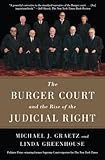The Burger Court and the rise of the judicial right / Michael J. Graetz and Linda Greenhouse.
Material type: TextLanguage: English Publisher: New York : Simon & Schuster, 2016Edition: First Simon & Schuster hardcover editionDescription: x, 468 pages : illustrations ; 24 cmContent type:
TextLanguage: English Publisher: New York : Simon & Schuster, 2016Edition: First Simon & Schuster hardcover editionDescription: x, 468 pages : illustrations ; 24 cmContent type: - text
- unmediated
- volume
- 1476732515
- 9781476732510
- Burger, Warren E. 1907-1995 (Warren Earl)
- United States. Supreme Court -- History -- 20th century
- Estados Unidos. Corte Suprema -- Historia -- Siglo XX
- Political questions and judicial power -- History -- 20th century
- Política y administración de justicia -- Historia -- Siglo XX
- Poder judicial -- Historia -- Siglo XX
- 347.73/262
- KF 8748 G735b 2016
| Item type | Current library | Home library | Collection | Shelving location | Call number | Copy number | Status | Date due | Barcode |
|---|---|---|---|---|---|---|---|---|---|
 Libro
Libro
|
Biblioteca Juan Bosch | Biblioteca Juan Bosch | Ciencias Sociales | Ciencias Sociales (3er. Piso) | KF 8748 G735b 2016 (Browse shelf(Opens below)) | 1 | Available | 00000122220 |
Includes bibliographical references and index.
The fall and rise of the death penalty -- Taming the trilogy -- Closing the federal courthouse doors -- Still separate, still unequal -- Seeking a higher education -- Privacy at a price -- The rocky road to sex equality -- Expression and repression -- A religious people's court -- Corporations are people too -- Battling workplace inequality -- Power and its abuse -- Richard Nixon in Warren Burger's court.
The magnitude of the Burger Court has been underestimated by historians. When Richard Nixon ran for president in 1968, "Impeach Earl Warren" billboards dotted the landscape, especially in the South. Nixon promised to transform the Supreme Court--and with four appointments, including a new chief justice, he did. This book tells the story of the Supreme Court that came in between the liberal Warren Court and the conservative Rehnquist and Roberts Courts: the seventeen years, 1969 to 1986, under Chief Justice Warren Burger. It is a period largely written off as a transitional era at the Supreme Court when, according to the common verdict, "nothing happened." How wrong that judgment is. The Burger Court had vitally important choices to make: whether to push school desegregation across district lines; how to respond to the sexual revolution and its new demands for women's equality; whether to validate affirmative action on campuses and in the workplace; whether to shift the balance of criminal law back toward the police and prosecutors; what the First Amendment says about limits on money in politics. The Burger Court forced a president out of office while at the same time enhancing presidential power. It created a legacy that in many ways continues to shape how we live today. Written with a keen sense of history and expert use of the justices' personal papers, this book sheds new light on an important era in American political and legal history.--Adapted from dust jacket.


There are no comments on this title.